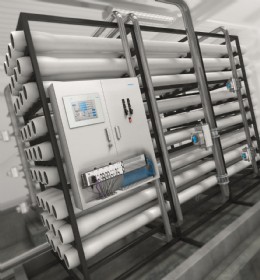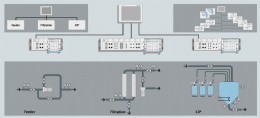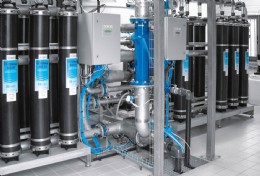Plants based on the Lego principle: modular automation is the answer to volatile markets in process industries

Kai Feller, Product Manager,Process Automation, Festo

Festo CPX automation platform for modular Industry 4.0 based skids

Numbering up instead of scaling up: with modular automation, plants can be expanded or modified in line with individual requirements. This illustration shows different variants of skids, ranging from a pump skid through to a filter module skid and CIP skid.

Highly flexible skids are fully transportable filter systems for situations when the demand for water is low, requiring the treatment of up to 1,000 m³ of water per day.With transportable filter systems, water production can be started up very quickly.
Process plants have traditionally been tailored to a respective task: output of x units of a specific liquid or throughput of x of per time unit. The mechanical design of the plant is geared towards meeting this specification over its projected life cycle, with corresponding process automation centrally controlled by a single management system. Changes or optimisations are therefore challenging, not to mention maintenance and servicing, where continuous processes might have to be completely shut down. But the market increasingly demands shorter product development times and customised products, particularly in the biotech/pharma, food and beverage, and water treatment segments, resulting in fundamental shifts in design and engineering requirements for process plants.
If we consider a water treatment plant, the operator must deal with wildly fluctuating water consumption and supply, not to mention increasingly polluted water. The traditional design for a water filtration plant includes valves, pumps, tanks, filters, sensors and pipes. The components for actuating the field devices are installed in a control cabinet, and a valve manifold and I/O racks are connected to a central controller with visualisation and connectivity to the management system via a fieldbus.
Today plants of this type can be modularised by breaking down the process and defining modules for each sub process with all the mechanical and automation components required for standalone operation. The automation components are also modularised: the control cabinet components and ‘central intelligence’ (process application software) are divided up so that each module has its own controller, remote I/O components and pneumatic actuators. Digitisation and networking enable autonomous, intelligent modules at the field level to be connected simply and reliably with a master control system – such as Festo’s CPX automation platform, while also providing communication between them – in the same way Lego® bricks click together to form a solid but nonetheless reconfigurable and adaptable structure.
In water treatment for example, skids in different configurations can be created, depending on the application. Pump skids, with their low level of complexity, require only a few valve slices in the pneumatic section of a valve terminal; filter module skids need analogue inputs and outputs for pressure monitoring. More complex modules, such as CIP (clean-in-place) skids, require further automation modules, such as analogue inputs for temperature measurement or a controller for the proportional technology. The skids operate autonomously and are extremely reliable, communicating continuously with a master controller managing the overall system. Costs for wiring are comparatively low and as the modules are transportable they enable water production to be started up very quickly.
Another example is in beverage production. Depending on the location of the factory, the contamination of raw water can be quite varied. That is why several treatment steps are necessary to get high-quality water. This can be achieved by a mix of various subsystems such as gravel filters, ion exchangers, ultrafiltration or reverse osmosis systems and a pumping station. The sales volume of the end product also fluctuates heavily on the consumer goods market. That is why consumption quantities of product and process water also fluctuate. Flexible water treatment that is based on modular automation is therefore all the more important.
For OEMs, the modular concept also means it is possible to produce low volumes of uniform modules or even produce skids for stock, delivering economies of scale both in production and assembly and reducing their costs. At the same time, the end users’ ability to deliver is enhanced as they can serve and respond to their markets more quickly with the right production quantities. This is where the worlds of the process industry and manufacturing industry meet – with Industry 4.0-enabled flexible production processes helping maintain the competitiveness of process industries in ever more volatile markets.
Flexible and modular production plants require autonomous intelligent units. Digitisation and networking enable automated modules at field level to be connected simply and reliably with a master control system, while also providing communication between them – in just the same way as Lego® bricks* click together to form a solid but nonetheless flexible structure. For a complete process industry plant, using modules makes the engineering process faster and more cost -efficient, as there is no need to modify the entire automation concept by expanding the complete plant, but only to connect the relevant automation modules to the management system. This ensures seamless communication between the various levels of the automation pyramid.
Flexible production processes, as described in the model “Industry 4.0”, are needed to maintain the competitiveness of process industries in ever more volatile markets. The prerequisite for this is adaptive, selfconfiguring and self-organising flexible water treatment plants with a high level of networking. Process-related and functional modularisation of plant sections is a sensible step for batch processes and systems with various filtration technologies.
Tel: 01252 775 000
Email: info_gb@festo.com
Web: www.festo.com/gb

| Telephone: | 0800 626422 |
| Email: | info.gb@festo.com |
| Website: | www.festo.com |
| More information on the Festo Ltd BVAA Member Directory Page |
Search related valve / actuator articles: Festo LtdIssue 43Solenoid ValvesPilot ValvesButterfly ValvesBall ValvesProcess ValvesDiaphragm Valves / Pinch ValvesActuatorsElectric ActuatorsRemote Control SystemsControllersSwitchboxesValve AutomationATEXFluid ControlFRLsFieldbusProximity SwitchesCylindersMaster ClassPneumatic ActuatorsControl PanelsPositionersFlow MetersMounting KitsManual ActuatorsValve IslandsPressure RegulatorsSensorsFittingsIsolating ValvesFilter RegulatorsSwitch BoxesPlug Valves







-web.jpg)





